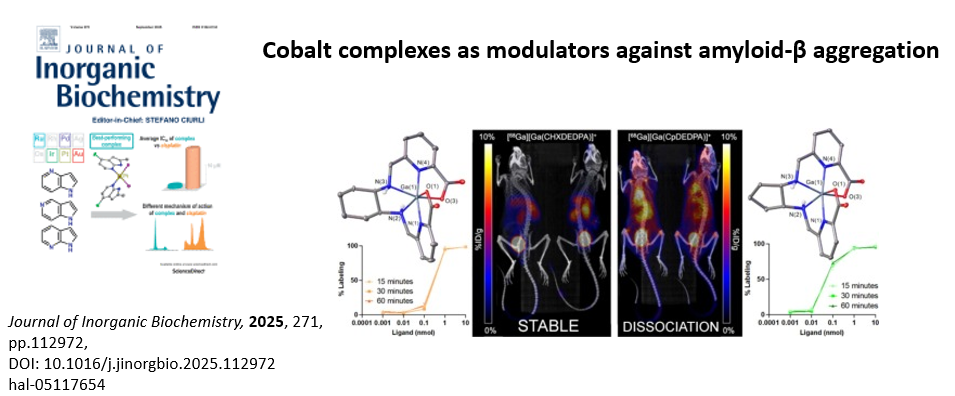
Cobalt complexes as modulators against amyloid-β aggregation.
Jeasang Yoo, Jong-Min Suh, Gunhee Kim, Hélène Bernard, Raphaël Tripier, et al..
Journal of Inorganic Biochemistry, 2025, 271, pp.112972,
DOI: 10.1016/j.jinorgbio.2025.112972
hal-05117654
12 Juin 2025
The progressive aggregation of amyloid-β (Aβ) peptides is central to the development of Alzheimer's disease, contributing to memory loss, cognitive decline, and neuronal degeneration. Transition metal complexes, owing to their tunable oxidation states and diverse coordination geometries, have been explored as chemical modulators to disrupt the aggregation pathways of Aβ peptides. Their biological applications, however, are often constrained by inherent toxicity and potential metal release. Herein, we report the selection and preparation of cobalt complexes with macrocyclic 1,4,8,11-tetraazacyclotetradecane (Cyclam) and 1,8-dimethyl-1,4,8,11-tetraazacyclotetradecane
(NO 3 ) 2 , and [Co(DMC)(Cl) 2 ]Cl, adopting either trans-III or cis-V geometry as relatively stable chemical reagents for controlling the assembly and toxicity profiles of Aβ peptides. Our mechanistic investigations reveal that these cobalt complexes can form adducts with Aβ peptides and, subsequently, redirect their aggregation pathway away from the canonical on-pathway process towards the formation of amorphous clusters and shorter fibrils. Furthermore, cobalt complexes mitigate Aβ-induced toxicity with minimal intrinsic toxicity in living cells. Overall, our study illustrates a guidance for selecting metal complexes as chemical modulators against Aβ amyloidogenesis by integrating the characteristics of both metal centers and ligand scaffolds.


